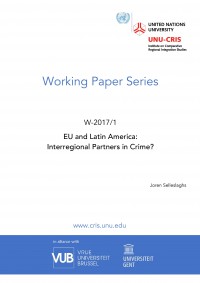EU and Latin America: Interregional Partners in Crime?

The European Union (EU) has adopted a very generous interregional approach towards Latin America over the past decades. In fact, EU foreign policy towards Latin America is almost exclusively focused on purely region-to-region interaction and active support to the various (sub-)regional integration efforts. Latin America is seen as the part of the world where the EU’s interregional agenda should bear the most fruit, since it shares the same values as the EU (democracy, human rights, nuclear non-proliferation and multilateralism) and has a strong willingness to counter-balance its close ties with the US. However, even though the EU adopted the same interregional strategy across different policy areas, the level of interregional interaction (and success) vary significantly. This paper argues that in the area of non-traditional security governance the EU’s interregional approach to Latin America has been successful in achieving its own-set goals, but that it has not had a considerable impact on the situation on the ground.
